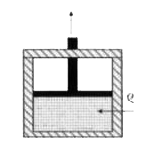400 J of work is done on a gas to reduce its volume by compression adiabatically. What is the change in internal energy of the gas?
To solve the problem, we will use the first law of thermodynamics, which relates the change in internal energy (ΔU) of a system to the heat added to the system (Q) and the work done on the system (W). The equation is given by:
ΔU=Q+W
1. Identify the Given Values:
- Work done on the gas (W) = 400 J (since work is done on the gas, we will consider it as positive).
- Heat transfer (Q) = 0 J (for an adiabatic process, there is no heat transfer).
2. Apply the First Law of Thermodynamics:
- According to the first law of thermodynamics:
ΔU=Q+W
- Substitute the values into the equation:
ΔU=0+400
3. Calculate the Change in Internal Energy:
- Therefore, the change in internal energy (ΔU) is:
ΔU=400J
Final Answer:
The change in internal energy of the gas is 400 J.
---
- Work done on the gas (W) = 400 J (since work is done on the gas, we will consider it as positive).
- Heat transfer (Q) = 0 J (for an adiabatic process, there is no heat transfer).
- According to the first law of thermodynamics:
ΔU=Q+W
- Substitute the values into the equation:
ΔU=0+400
- Therefore, the change in internal energy (ΔU) is:
ΔU=400J
The change in internal energy of the gas is 400 J.
Similar Questions
One mole of an ideal monoatomic gas occupies a volume of 1.0×10−2m3 at a pressure of 2.0×105N/m2.
(a) What is the temperature of tha gas?
(b) The gas undergoes an adiabatic compression until its volume is decreased to 5.0×10−3m3. What is the new gas temperature?
(c) How much work is done on the gas during the compression?
(d) What is the change in the intenal energy of the gas?
View SolutionIn a thermodynamics process, 300 joule of heat is supplied to a gas and 200 joule of work is done by the gas. What is the change in internal energy of the system?
View Solution
Knowledge Check
If a gas is comprssed adiabatically by doing work of 150 J the change in internal energy of the gas is
A100 JB150 JC200 JD250 JDuring an adibatic compression ,830 J of work is done on 2 moles of a diatomic ideal gas to reduce its volume by 50%. The change in its temperature is nearly:
A40KB33KC20kD14KIn thermodynamic process, 200 Joules of heat is given to a gas and 100 Joules of work is also done on it. The change in internal energy of the gas is
A100jB300jC419jD24j
When the gas enclosed beneath the piston shown in the figure receives 1930 J of heat, Q, from its surroundings, it performs 2250 J of work in raising the piston. What is the change in the internal energy of the gas?

View SolutionMethod 2 of ΔU
Work done by a gas in a given process is −20J. Heat given to the gas is 60J. Find change in internal energy of the gas.
View Solution1 liter of an ideal gas (γ=1.5) at 300k is suddenly compressed to half its original volume. (a) Find the ratio of the final pressure to the initial pressure. (b) If the original pressure is 100kpa, find the work done by the gas in the process. (c) What is the change in internal energy? (d) What is the final temperature? (e) the gas is now colled to 300k keeping its pressure constant. Calculate the work done during the process . (f) The gas is now expanded iasothermally to achive its original volume of 1 liters. Calculate the work done by the gas .(g) Calculate the total work done in the cycle.
View SolutionIn an adiabatic process 90 J of work is done on the gas. The change in internal energy of the gas is
View SolutionWhen an ideal gas undergoes an adiabatic change causing a temperature change ΔT
(i) there is no heat ganied or lost by the gas
(ii) the work done by the gas is equal to change in internal eenrgy
(iii) the change in internal energy per mole of the gas is CVΔT, where CV is the molar heat capacity at constant volume.
View Solution